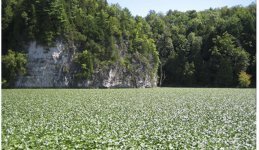In paddling around the lakes and dammed up rivers in Connecticut, green scummy slime and icky weeds seem to be ever increasing, especially during the high heat and drought conditions recently.
For example, Connecticut's largest natural lake currently has a red light warning about poisonous cyanobacterial algae and other plankton, and my local lake/river has increasingly serious problems with Eurasian milfoil. Minor naiad, curly leaf pondweed and water chestnut are also problems. Added to this vegetative ick, a zoological invader, zebra mussels, are also causing increasing problems.
Chemical treatments, weed-pulling machines, and winter draw-downs to freeze the weeds only seem to be temporary band-aids. I was pleasantly surprised to be in a pond the other day where I could actually peer down to the bottom through clear waters instead of through a green film of murk.
Do you have these kinds of vegetative and zoological water pollutants where you are, and can anything really be done about them?
For example, Connecticut's largest natural lake currently has a red light warning about poisonous cyanobacterial algae and other plankton, and my local lake/river has increasingly serious problems with Eurasian milfoil. Minor naiad, curly leaf pondweed and water chestnut are also problems. Added to this vegetative ick, a zoological invader, zebra mussels, are also causing increasing problems.
Chemical treatments, weed-pulling machines, and winter draw-downs to freeze the weeds only seem to be temporary band-aids. I was pleasantly surprised to be in a pond the other day where I could actually peer down to the bottom through clear waters instead of through a green film of murk.
Do you have these kinds of vegetative and zoological water pollutants where you are, and can anything really be done about them?

